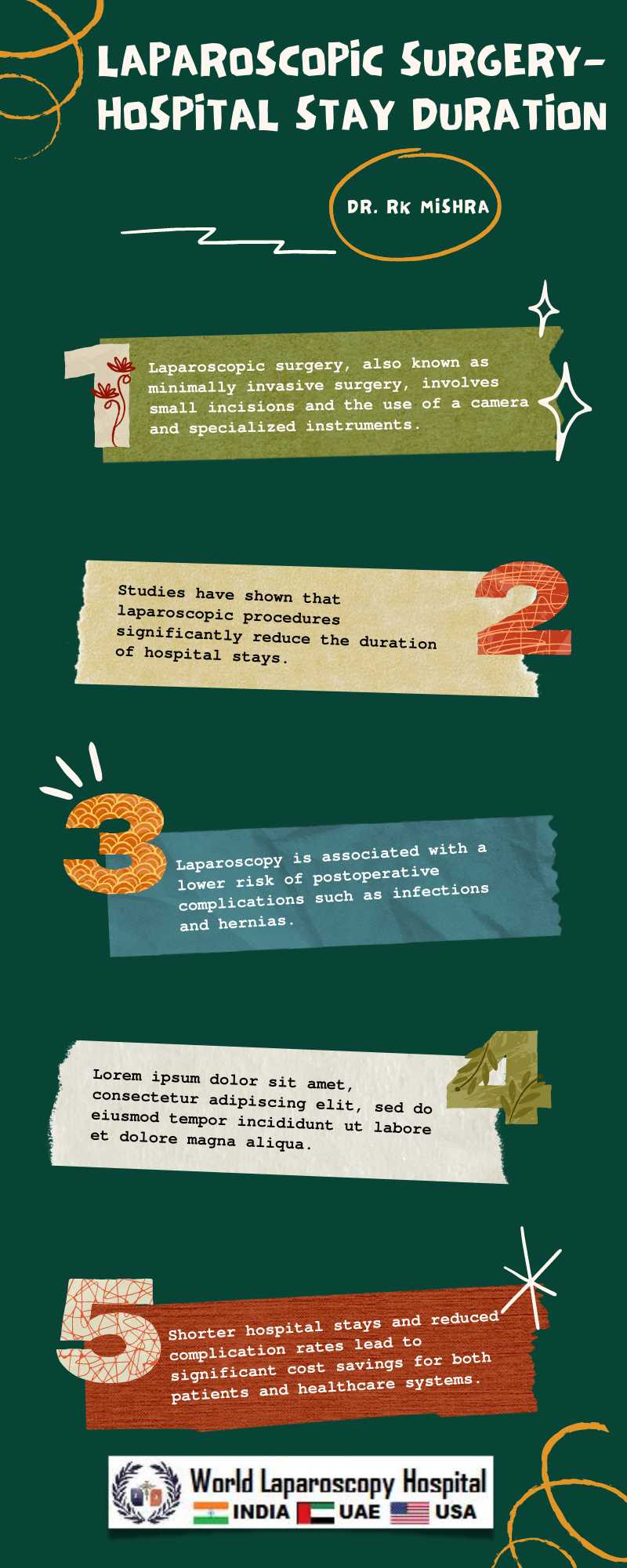Laparoscopic Surgery and Its Impact on Hospital Stay Duration
Laparoscopic surgery, also known as minimally invasive surgery, has revolutionized the field of surgery over the past few decades. This technique employs small incisions, usually 0.5-1.5 cm, as opposed to the larger incisions used in traditional open surgery. The use of a laparoscope, a thin tube with a high-intensity light and a high-resolution camera at the front, allows surgeons to visualize the internal organs on a screen and perform the surgery using small instruments.

One of the most significant impacts of laparoscopic surgery is its effect on hospital stay duration. Traditionally, open surgery required extended hospital stays due to the larger wounds, increased risk of infection, and longer recovery times. However, with the advent of laparoscopic techniques, the dynamics have shifted considerably.
Firstly, the smaller incisions used in laparoscopic surgery result in reduced postoperative pain for patients. This not only enhances patient comfort but also reduces the need for postoperative pain management, which can often prolong hospital stays. The reduced pain also enables patients to resume mobility sooner, which is a critical factor in preventing postoperative complications such as thrombosis and pneumonia, further shortening the hospital stay.
Secondly, the minimally invasive nature of laparoscopic surgery significantly lowers the risk of surgical site infections (SSIs). SSIs are a common cause of extended hospitalization following open surgery. The small incisions heal faster and are less susceptible to infection, thus reducing the overall risk and contributing to shorter hospital stays.
Moreover, laparoscopic surgery is associated with a faster recovery of bowel function. In abdominal surgeries, particularly, the return of bowel function is a crucial milestone for discharge. Since laparoscopic surgery causes less trauma to the abdominal wall and the intestines, patients often experience a quicker return to normal bowel function, reducing the length of the hospital stay.
The impact of laparoscopic surgery on hospital stay duration also has significant economic implications. Shorter hospital stays translate into lower hospital costs for patients and healthcare systems. This can lead to more efficient use of hospital resources, allowing healthcare facilities to serve a larger number of patients.
However, it's important to note that laparoscopic surgery is not without its challenges and may not be suitable for all patients. The technique requires specialized training and expertise, and there are cases where open surgery might still be the preferred method due to the complexity of the procedure or patient-specific factors.
Conclusion:
Laparoscopic surgery has had a profound impact on reducing hospital stay duration. Its benefits of reduced postoperative pain, lower risk of infections, faster recovery times, and quicker return of bowel function contribute significantly to this outcome. As technology and surgical techniques continue to evolve, the scope of laparoscopic surgery is likely to expand, further enhancing patient outcomes and healthcare efficiency.

One of the most significant impacts of laparoscopic surgery is its effect on hospital stay duration. Traditionally, open surgery required extended hospital stays due to the larger wounds, increased risk of infection, and longer recovery times. However, with the advent of laparoscopic techniques, the dynamics have shifted considerably.
Firstly, the smaller incisions used in laparoscopic surgery result in reduced postoperative pain for patients. This not only enhances patient comfort but also reduces the need for postoperative pain management, which can often prolong hospital stays. The reduced pain also enables patients to resume mobility sooner, which is a critical factor in preventing postoperative complications such as thrombosis and pneumonia, further shortening the hospital stay.
Secondly, the minimally invasive nature of laparoscopic surgery significantly lowers the risk of surgical site infections (SSIs). SSIs are a common cause of extended hospitalization following open surgery. The small incisions heal faster and are less susceptible to infection, thus reducing the overall risk and contributing to shorter hospital stays.
Moreover, laparoscopic surgery is associated with a faster recovery of bowel function. In abdominal surgeries, particularly, the return of bowel function is a crucial milestone for discharge. Since laparoscopic surgery causes less trauma to the abdominal wall and the intestines, patients often experience a quicker return to normal bowel function, reducing the length of the hospital stay.
The impact of laparoscopic surgery on hospital stay duration also has significant economic implications. Shorter hospital stays translate into lower hospital costs for patients and healthcare systems. This can lead to more efficient use of hospital resources, allowing healthcare facilities to serve a larger number of patients.
However, it's important to note that laparoscopic surgery is not without its challenges and may not be suitable for all patients. The technique requires specialized training and expertise, and there are cases where open surgery might still be the preferred method due to the complexity of the procedure or patient-specific factors.
Conclusion:
Laparoscopic surgery has had a profound impact on reducing hospital stay duration. Its benefits of reduced postoperative pain, lower risk of infections, faster recovery times, and quicker return of bowel function contribute significantly to this outcome. As technology and surgical techniques continue to evolve, the scope of laparoscopic surgery is likely to expand, further enhancing patient outcomes and healthcare efficiency.
2 COMMENTS
Dr. Shubranil Paul
#1
Feb 14th, 2024 8:36 am
Laparoscopic surgery significantly reduces hospital stays, thanks to benefits like less pain, fewer infections, faster recovery, and quicker bowel function return. As technology advances, laparoscopic surgery's scope will likely expand, further improving patient outcomes and healthcare efficiency.
Dr. Ashish Ranjan
#2
Feb 27th, 2024 5:24 pm
Laparoscopic surgery significantly shortens hospital stays due to its advantages like reduced pain, infection risks, and quicker recovery. As technology advances, laparoscopic procedures are poised to expand, delivering better patient outcomes and healthcare efficiency.
| Older Post | Home | Newer Post |

